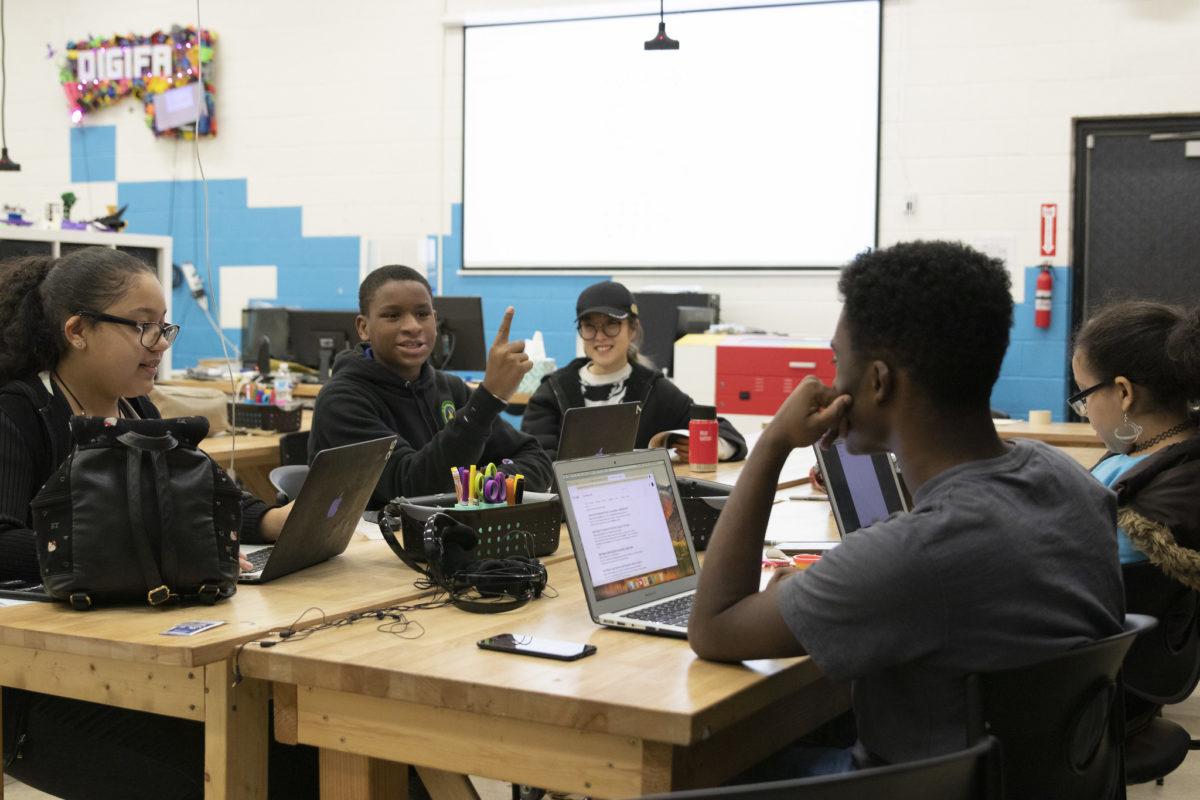City recreation departments in Baltimore and Pittsburgh are collaborating with Baltimore’s Digital Harbor Foundation (DHF) and UMBC as they bring youth makerspaces to rec centers.
The National Science Foundation awarded a $1.5 million research grant to DHF and the university that will support creating computer science and tech hubs at two rec centers in each city. The grant will support training for rec center staff and the tech programming for youth. The effort will also develop a toolkit that will be available online for any city seeking to localize the programming.
The Advancing Informal STEM Learning award means a formal role for DHF’s rec-to-tech model inside city government-run rec centers. The nonprofit has launched many different initiatives in recent years, but the work inside rec centers has always seemed a natural path given its origin.
In 2013, its Federal Hill tech center opened for youth after-school programming, camps and 3D printing programs inside a shuttered city rec center that was closed due to city budget woes. As programming grew and they got asked about scaling.
“Our answer has been, we want to partner and collaborate and train, and work to support others,” said Executive Director Andrew Coy.
Rather than duplicate its own center, the idea was to help others adopt the model to fit their own setting, whether it be a school, city rec center or a community space that’s underutilized. Now they’ll look further at how to create programming that is responsive to the community.
“That localization is a key question and aspect of the research, and it’s something we care a lot about,” Coy said of the NSF-funded grant. “I’m not going to pretend I know how best to structure and run a program in another city, or another part of town even.”
Over three years, DHF and a UMBC team led by assistant professor Dr. Foad Hamidi will study the processes and challenges of creating computer science and tech hubs in community spaces, with a focus on equity. And in their work supporting the staff, they’ll be able to gain insight and share the best practices that rec centers are learning as they localize. So instead of just releasing data, they’re building out together, with the hopes that others will pick up the ideas, as well. Working with , the idea is to create a systematic approach to including youth and educators from the community in the design.
“We are investing in local communities,” Coy said. “This is a true collaboration.”
We are investing in local communities. This is a true collaboration.
The collaboration with Pittsburgh is a sign of the influential role DHF has gained along the way. Its approach to growing the model solidified with the launch of its Center of Excellence for Innovation in Technology Education in 2014 as an initiative focused on best practices that was separate from its in-house programming. The center already had a national model by then, drawing visitors from outside Baltimore interested in seeing the tech center. Then rec-to-tech’s platform got a bigger megaphone when Coy went on in 2015 to serve as a senior advisor on maker education initiatives in the White House Office of Science and Technology Policy during the Obama years. (He returned to DHF in 2018.)
During those years Coy worked in Washington, former U.S. CTO Megan Smith talked about rec-to-tech during a session at SXSW in Austin. Pittsburgh Mayor Bill Peduto was among those in the crowd, and got to work figuring out how to apply it in Pittsburgh. The city has since hired digital inclusion coordinator Maximilian Dennison, and the partnership with Baltimore represents the rec-to-tech model expanding.
Speaking at a virtual event to discuss the partnership on Thursday, Peduto Dennison said the rec-to-tech model connects the programming offered at rec centers to the economic change happening in a city where tech jobs are growing. Pittsburgh plans to open 10 rec-to-tech sites in all.
“Rec-to-tech is much more than just youth programming or something for students to do after school. It’s really allowing us to address systemic issues such as the digital and the opportunity to put diversity in tech,” Dennison said, adding that it will also provide the “opportunity to create on-ramps for young people to create sustainable livings for themselves by teaching them 21st century skills.”
For its part, the City of Baltimore is also growing capacity. Baltimore City Parks and Rec recently hired Rebecca Palmisano as STEM coordinator to oversee rec-to-tech and STEM programming in the agency overall. The city has plans to bring rec-to-tech to a total of six sites, which have yet to be announced. They are expected to be activated when easing of COVID-19 restrictions allows. For now, it is hiring staff and getting prepared. Coy said the timeline of the research could also shift, given the pandemic.
At the event, Mayor Bernard C. “Jack” Young recounted being the first city government official to meet with Coy and promote the idea of the tech center when he was on the City Council. Young, who will leave office next month, credited Coy with pushing forward, even when the idea of working with the city didn’t catch on under past recreation directors.
“Our young people, every time I came through the center, were so excited and so happy and showing me all the things that they could do. He opened up a whole new experience for our young people,” Young said of Coy.







